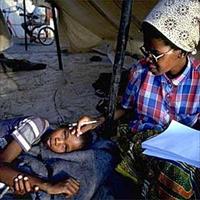GUINEA-BISSAU: Cholera epidemic out of control

With 6,461 cholera cases and 122 deaths, experts say the cholera epidemic in Guinea-Bissau is out of control.
The number of reported cases has doubled in the past three weeks. All of the country’s 11 health regions have been affected, including the remote Bijagos islands, 60 km off the Bissau coast, which have reported 158 cases.
“At the moment, though measures are in place to deal with the epidemic, the situation is not under control,” said Daniel Remartinez, emergency coordinator of the Spanish branch of non-governmental organisation (NGO) Médecins sans Frontières (MSF-S).
Hardest hit is Bissau with more than 4,500 cases, followed by Biombo region with 836 reported cases, Quinara with 216 and Oio with 215.
“Bissau [the capital] is a fantastic crossroads from which to spread the epidemic throughout the country – all traffic goes through it,” said Sylvana Nzirorera, deputy-representative of the UN Children’s Fund (UNICEF) in Bissau.
According to Franck Bouvet, UNICEF’s regional water, hygiene and sanitation specialist, international agencies over-estimated the government’s ability to coordinate the battle against the epidemic, costing valuable time.
Emergency response teams from the UN and government, MSF-Spain, French NGO Médecins du Monde and the Guinea Bissau Red Cross, are trying to make up for lost time.
Zero capacity
Cholera is endemic in Guinea-Bissau, which has hardly any water pipes in most of the country, and an ailing pipeline in Bissau, which only reaches a quarter of the city’s residents, according to UNICEF.
With no government budget to build up such networks, most people construct their own poorly-maintained wells, according to UNICEF’s Nzirorera.
Few organised community groups have stepped in to manage water wells, pumps and other sources, said Nzirorera. “In Bissau when there is an emergency, it is hard to know who in the community to talk to,” she pointed out.
International response
MSF-Spain is helping the government control the infection and treat cases in 17 health centres and hospitals in Bissau as well as Biombo and Oio regions bordering the capital.
According to MSF-S's Remartinez, cholera victims had not been safely quarantined from other patients in health centres, so MSF-S set up tents to treat them separately.
UNICEF is disinfecting city wells and other water sources with bleach or chlorine in the capital with local organisation Aqua Guinea-Bissau (AGB) and volunteer sanitation brigades.
They have only been able to find less than half of the 3,000 wells thought to exist according to Nzirorera, because they are so well-hidden.
Duarte Falcon, data-manager of the government's national epidemiology unit told IRIN the government is working with the Guinea Bissau Red Cross and UNICEF to go from door-to-door to give hygiene tips to avoid cholera.
For Nzirorera, children are “the best vectors of [public hygiene] messages for families”, and religious leadershave the “charisma and power to persuade their followers.”
Next Steps
UNICEF’s water expert Bouvet says the government has little information about how the infection is spread, or its source. To date, experts say the government has not carried out a nation-wide comprehensive study, which would require multi-region data gathering and analysis.
The US-based Centre for Disease Control is expected to lend the technical know-how and is currently carrying out this study.
“There are behavioural, climactic, and socio-economic determinants to the cause and spread of cholera and it can be hard to identify exactly why it appears when and how. However, we know that key factors increase the risk of an outbreak: inappropriate hygiene behaviour, lack of drinking water, and inadequate sanitation,” Bouvet said.
For UNICEF’s Nzirorera, the battle-lines now need to shift beyond the capital so the disease does not escalate in more remote regions.
Most experts agree the government lacks a national plan to fight cholera long-term.
Meanwhile, emergency organisations are trying to address short-term needs.
“We’ll stay until the epidemic is under control. We have no idea how long that will be – it depends if the epidemic has reached its peak, or if that is still to come,” said Remartinez.
 Back and Next - Back and Next
Back and Next - Back and Next See Also - See Also
See Also - See Also